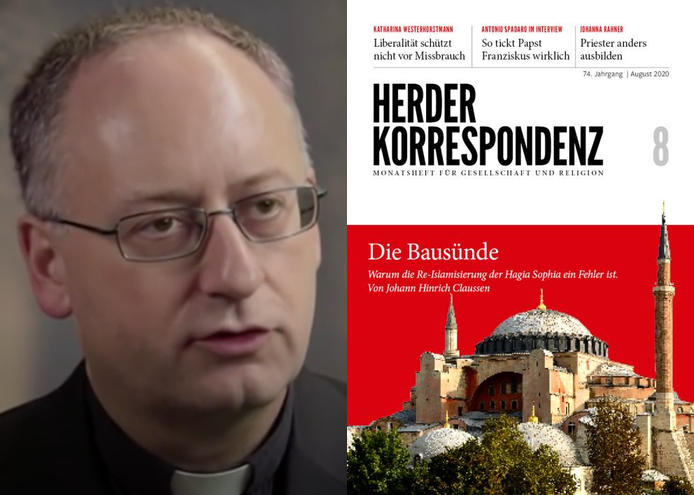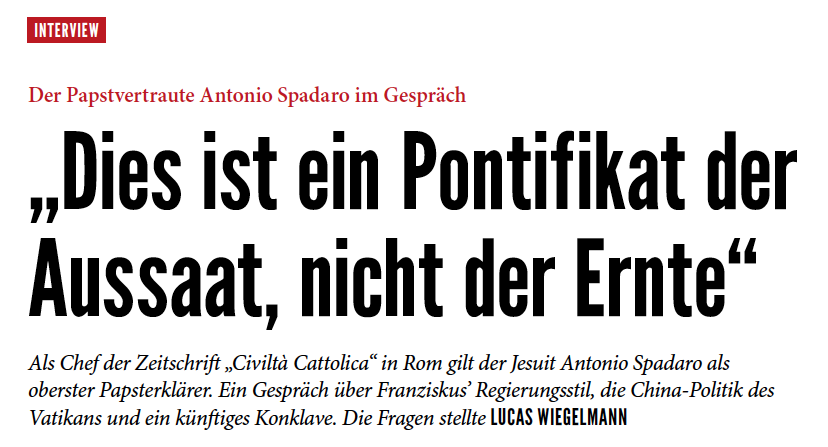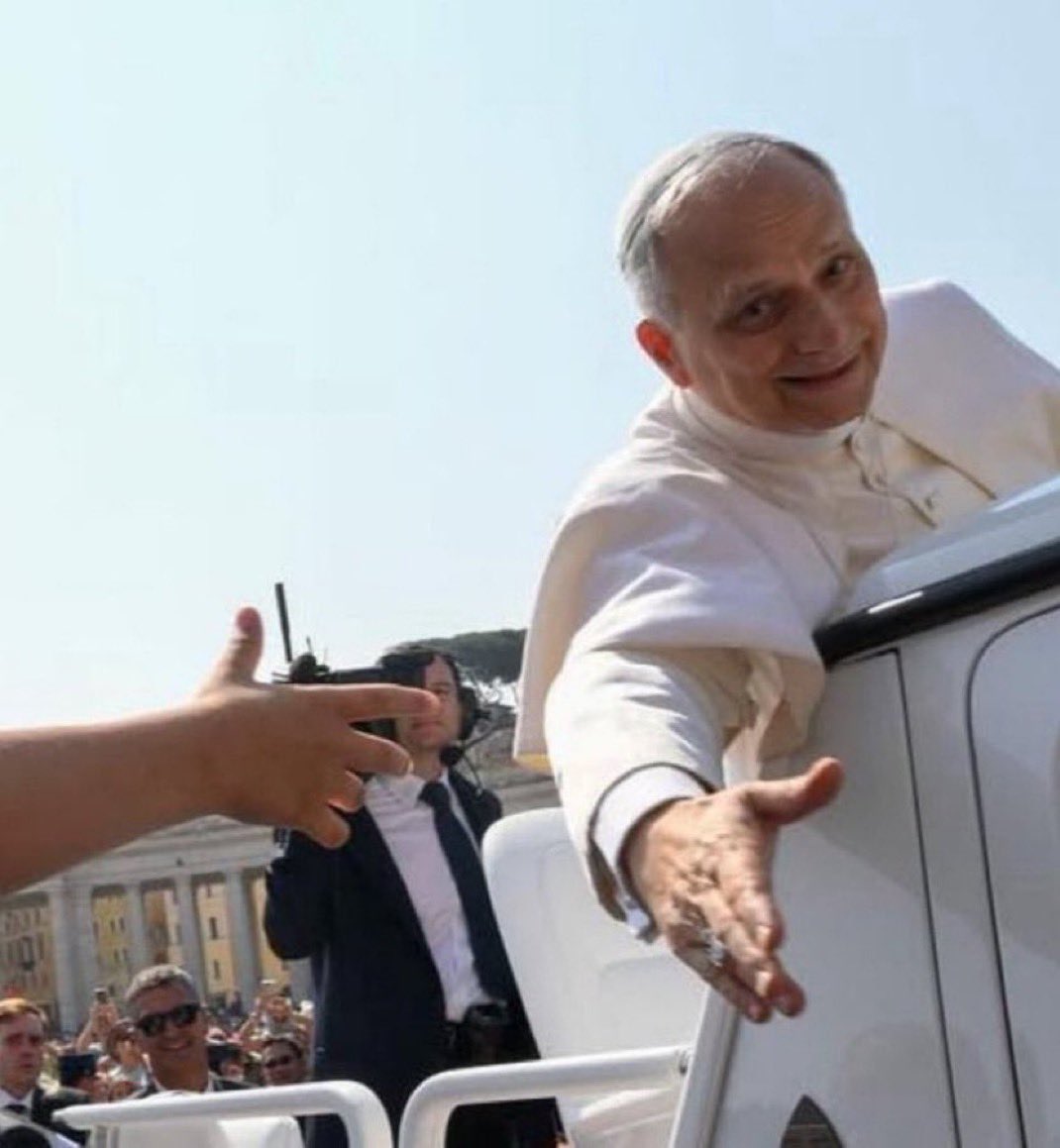He’s been fooling millions!
Antonio Spadaro on Francis:
“Any Kind of Narcissism is Infinitely Far from Him”

One of Jorge Bergoglio’s most loyal admirers in the Vatican is the Rev. Antonio Spadaro, S.J. He is the editor-in-chief of the formerly Catholic Jesuit periodical (now Modernist rag) La Civiltà Cattolica. It was he who got the pseudo-pope’s first written interview, in September of 2013, and he has been carrying the water for his boss from the beginning. In 2017, Spadaro captured the limelight in the international press by accusing conservative religious voters in the U.S. of an “ecumenism of hate”.
The Aug. 2020 edition of the German theological journal Herder Korrespondenz, itself not exactly known as a beacon of orthodoxy, features an interview with “Fr.” Spadaro, conducted by Lucas Wiegelmann. It includes a few interesting tidbits we would like to share with our readers.
Asked about whether Francis’ style of governance was still brusque and headstrong, as he once admitted it had been when he was provincial of the Jesuits, Spadaro answers:
I never experienced such a situation. The impression I have of him I would describe as “calm chaos”: On the one hand I see a great force, a strong character, passionate energy, a personality not of pale but of vibrant colors. At the same time, however, he knows how to control himself. He can wait, can reflect, he gives [people] space. It is as though he were always absorbed in God. I’ve never heard rough words from him.
(Antonio Spadaro, in Lucas Wiegelmann, “Dies ist ein Pontifikat der Aussat, nicht der Ernte”, Herder Korrespondenz, vol. 74 [Aug. 2020], n. 8, p. 21; our translation.)
The interviewer then goes for the juggular and challenges Spadaro to mention three specific qualities in Francis that bother him. He responds by saying that he probably can’t think of that many, but there is one thing that always amazes him: “Let me put it this way: Any kind of narcissism is infinitely far from him” (p. 21). Riiight…
When Wiegelmann points out that a lack of narcissism obviously isn’t a weakness, Spadaro argues that Francis’ incredible load of humility nevertheless bothers him because it exposes his own pride:
No. But since all of us are at least a little bit narcissistic, one notices, when meeting him, that there is something wrong with oneself. And that isn’t pleasant. He is simply very far removed from letting himself be put in the center in any way. If, for example, one wishes to speak to him about himself and perhaps compliments him or makes some other nice comment, he simply ignores it. He doesn’t react at all. You have to get used to that at first, and that’s exhausting. There is always a possibility he will embarrass you in your [own] narcissism.
(Spadaro, p. 21)
So there! Spadaro found a way to turn a request to say something negative about Francis into an immense celebration of his unparalleled and much-touted “humility”! Francis is so humble, his humility forces everyone else to become aware of their own narcissism! Does it get any more ridiculous than that?! A man so humble, he will embarrass you for being proud because you said something nice to him! (By the way: The typical way for a humble man to deal with a compliment is for him to say “thank you” and then change the subject. To habitually ignore someone who pays him a compliment would be rude.)
Why Spadaro would see the need to bring up the specific fault of narcissism in connection with Bergoglio at all, is not clear, but quite telling. Henry Sire’s book The Dictator Pope paints quite a different picture of the Argentinian squatter in the Vatican guest house, and various news reports over the years clearly confirm that the elusive virtue of humility is demonstrably not one of Francis’ strong suits.
For example, it was the Oct. 2018 edition of the same journal, Herder Korrespondenz, that included a report on Vatican sources claiming that what “Abp.” Carlo Vigano had revealed about Francis’ involvement in covering up sex abuse is basically true, except it’s worse. In 2016, the well-respected Vaticanist Edward Pentin reported that Francis was “boiling with rage” at learning of the now famous dubia submitted by four of his own “cardinals”, challenging him on Amoris Laetitia. In a Spiegel report released in Sep. 2018, a man identified only as a “senior cardinal” described his boss as a “cold-blooded, cunning Machiavellian [who] lies” — not exactly a ringing endorsement of the man for whom Spadaro cannot find enough superlatives.
If Francis’ reported comment, “I may go down in history as the one who split the Catholic Church”, exudes any kind of virtue, it is certainly not that of humility. Moreover, his cavalier announcement that he is “not afraid of schisms”, his unceremonious dismissal of “Cardinal” Gerhard Müller from the Vatican’s top doctrinal post, his omission of the papal benediction because it might offend non-Catholics, his insult of St. Teresa of Avila as “la vieja” (“the old one”) — such are not the words and actions of a man who is truly humble, much less one who is the epitome of humility. All that is to say nothing of his frequent heresies, blasphemies, and other scandals, documented on our Francis topical page — they are hardly the marks of a humble man “always absorbed in God.”

“This is a pontificate of sowing, not of harvesting”, Spadaro says — a threat?
Other hilarious comments in the Herder Korrespondenz interview include Spadaro’s affirmation that “[i]t is clear that the topic of evangelization is of the highest priority for the Pope” (p. 24). Oh yes, no doubt about it. That must be why Francis continually affirms members of other religions in their unbelief, tells youngsters in Mozambique that religious differences among people “are necessary”, says that atheists can go to heaven as long as they are “good” atheists, assures sodomites that they never lose their dignity, no matter what they do, and is working to ensure that the apostate principles of the 2019 Abu Dhabi declaration — according to which “God desires a diversity of religions” — are taught and implemented around the globe. Yes, no doubt, Our Lord’s Great Commission to preach the Gospel to all people so as to make disciples of all nations, lest they be condemned to hell for all eternity (see Mk 16:15-16), is near and dear to Bergoglio’s heart.
Spadaro closes the conversation with some sombering thoughts. He points out that Francis’ “pontificate” has been one of sowing, not of reaping. “The Pope has planted a lot of seeds in the last years. His successor won’t be able to ignore that, won’t be able to go backward. He will move forward” (p. 24). Anyone retaining a modicum of Catholicism can only see this as a threat, for what Francis has been sowing is nothing but cockle — just as his five inglorious predecessors did, with very visible results: “An enemy hath done this” (Mt 13:28).
Once the blessed day comes when the theological clown show known as the Vatican II religion is finished and the history of that counterfeit church gets written, “Fr.” Spadaro will be remembered as one of Francis’ most obsequious admirers.
Alas, it will not be to his credit.
Image sources: youtube.com (screenshot) and herder-korrespondenz.de
Licenses: fair use





No Comments
Be the first to start a conversation